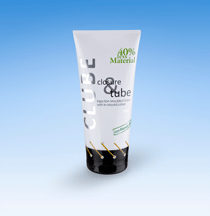The global beauty care brand owner has bought a mold and installed it at Dutch processor Plasticum, which is using the tool to supply L'Oréal with bi-material injection molded plastic tubes that beat extruded ones for design and novelty.
May 4, 2011
The global beauty care brand owner has bought a mold and installed it at Dutch processor Plasticum, which is using the tool to supply L'Oréal with bi-material injection molded plastic tubes that beat extruded ones for design and novelty.
|
Above, a standard CLUBE such as the ones molded at last fall's K show, and below the ones being molded for L'Oreal, with two chambers to allow for multiple materials in the tube. |
|
Injection molder Plasticum (Tilburg, The Netherlands) has developed a customized CLUBE exclusively for L'Oréal. CLUBE is the name that Plasticum gives to a packaging technology it introduced under that name at the K show in Germany last fall. The roots of this type of injection molded tube, however, stretch back to at least 2007 when an Australian company, Zestron, licensed its technology for injection molding of tubes to Plasticum in Europe, and to Yorker Packaging in the U.S.
In 2004 Zestron and injection moldmaker Otto Hofstetter AG (Uznach, Switzerland) formed an alliance to develop commercial tooling for Zestron tube production, and one year later Zestron formed an alliance with Waldorf Technik (Engen, Germany), with Waldorf offering in-mold labeling systems for Zestron tubes. Here you can read our initial coverage of the Zestron technology for injection molding of plastic tubes in this article.
The CLUBEs shown at the K show, molded on an Engel injection molding machine, were round, one-piece bi-injection molded tubes with integrated closure and in-mold labels. The technology also allows for molding of tubes shapes as squares or triangles. (Here is a link to a nearly 3-minute video of that Engel molding cell at K 2010.) But the injection molded plastic tubes for L'Oréal go beyond the initial promise of these tubes. In response to question from PlasticsToday, Ilona Vermeer, marketing manager for the Plasticum Group, explained, "L'Oréal was the first company that invested in a custom mold for a special tube design: a two-component CLUBE. To realize this, Plasticum teamed up with its preferred supplier, also a toolmaker. Plasticum molds this two-component CLUBE exclusively for L'Oréal. The closure is a polypropylene (PP) and the body is a modified PP." She confirmed that Plasticum makes use of the Zestron patent to mold the CLUBEs but has its own patent filed on molding of a one-piece tube with integrated closure (the CLUBE).
In this molded tube, a single CLUBE includes two separate chambers, a feature that attracted it as it already had developed two-component cosmetic applications, but never found the right packaging with which to market these. Plasticum's CLUBE offered the answer. The L'Oréal CLUBE is labeled in-mold. The body and flip-top closure are fully integrated to form a single part. The body of the tube contains two separate chambers that can be filled with two different formulations. The closure has two holes to dispense the two formulations. As soon as these formulations are mixed, they react chemically to develop the right effect.
According to Plasticum, injection molding of tubes offers not only design freedom and more opportunities for integration of functions, but also can be done for less capital expense and with significantly less of a footprint in a production facility. Plus, since the tube shoulder has been eliminated, up to 40% material is saved. Plasticum will be displaying its CLUBE packaging at the Interpack 2011 exhibition in Düsseldorf, Germany from May 12 - 18 at its stand, C 06 in hall 10.
About the Author(s)
You May Also Like




